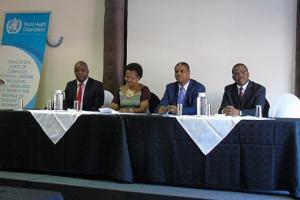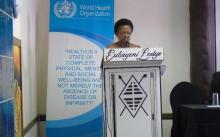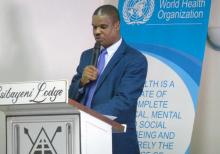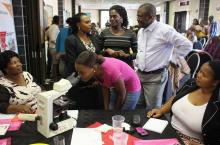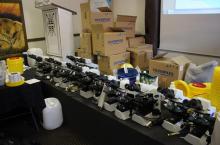Swaziland embarks on neglected tropical disease mapping survey
The Kingdom of Swaziland through the Bilharzia and Worms Control Programme under the Ministry of Health is embarking on a national integrated mapping survey for schistosomiasis and soil-transmitted helminthiasis. Following several months of detailed planning the beginning of the survey was marked by a five day national training workshop for the survey teams. The survey, to run from the 16 February to the 6 March will cover all the 55 tinkhundla(districts), 275 primary schools, and 13 750 learners between 10 and 14 years of age.
The national workshop held at Esibayeni Lodge in Manzini, was combined with a three day Regional workshop for national NTD data managers and WHO NTD focal persons from Botswana, Lesotho, Malawi, Mozambique, Namibia, Swaziland, Zambia and Zimbabwe.
The two workshops were officially opened by Mrs Rejoice Nkambule. Mrs Nkambule, who is the Deputy Director of Health Services (Public Health) represented the Principal Secretary in the Ministry of Health. In attendance were the WHO Country Representative, Dr Owen Kaluwa, the WHO NTD Prevention and Control Regional Advisor, Dr Adiele Onyeze, and other senior government officials.
NTD mapping experts, Professor Njeri Wamae and Dr Pauline Mwinzi, the WHO/IST/ESA PC NTD Mapping Technical Officer, Dr Mutale Nsakashalo Senkwe, the IST/ESA NTDs Data Manager, Joyline Marimo, Communication consultant for IST, Ingrid Tagwireyi, and representatives from Task Force for Global Health, Kisito Ogoussan and Kristen Renneker were also in attendance. Overall, there were more than 100 national participants and 16 participants from other countries as well as members of the media.
Mrs Nkambule thanked the national multisectoral and multidisciplinary Survey Task Team for investing time and effort in a comprehensive community mobilization drive and planning for the survey. She also emphasized the importance of the survey in generating evidence for developing strategies for the prevention and control of schistosomiasis and soil-transmitted helminthiasis in line with the principles of evidence-based programming. She also extended the Government’s gratitude toward the technical and financial support provided by WHO, UNICEF and other development partners.
Dr Adiele Onyeze introduced the international participants and the facilitators of the workshops and briefly talked about the importance of NTD mapping and the introduction of smart phones for data collection. Dr Kaluwa on behalf of WHO, recognized the presence of colleagues from different countries in the sub-region, experts as well as the survey teams. He reiterated WHO’s support towards the mapping survey as well as provision of technical support in terms of policy formulation, strategic planning and monitoring and evaluation of NTD prevention and control in the country.
The national teams were trained on the survey methodology which included sampling, specimen collection and processing, and data collection. The training also covered urine filtration method as well as the Kato Katz method. The national teams together with the international participants were then trained on the use of smart phone for data collection, facilitated by the Global Task Force for Health Support Center in Atlanta. The workshop also included a half day of field work for testing the tools.
After the five day training the teams were deployed into the field ready to collect data.
___________________________________________
Mrs Rejoice Nkambule officially opening the workshops
The WR, Dr. Owen Kaluwa delivering his remarks during the official opening ceremony
From right to left: Dr Onyeze, Dr Senkwe, Dr Mwinzi facilitating practical session during the training workshop
Some of the supplies for field work before distribution to the survey teams
